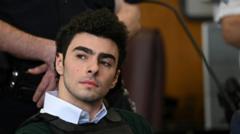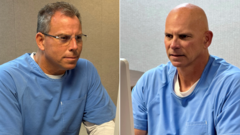Luigi Mangione, 26, faces federal charges after allegedly killing UnitedHealthcare CEO Brian Thompson to send an ideological message against the healthcare industry. His case has spotlighted ongoing debates about the U.S. healthcare system, placing him at the intersection of legal proceedings and contentious political discourse.
Prosecutors Seek Death Penalty for Luigi Mangione Amid Ideological Claims

Prosecutors Seek Death Penalty for Luigi Mangione Amid Ideological Claims
Federal prosecutors have officially announced their intent to pursue the death penalty against Luigi Mangione, accused of murdering a healthcare CEO in New York.
In a surprising turn of events, U.S. federal prosecutors have filed a formal notice requesting the death penalty for Luigi Mangione, the 26-year-old accused of fatally shooting UnitedHealthcare CEO Brian Thompson in New York. The prosecutors argue that Mangione's actions were intended to amplify an ideological message and instigate resistance against the health insurance sector.
This official move comes just hours before Mangione's plea hearing, where he faces four federal charges. Notably, Thompson was shot outside a hotel on December 4, and Mangione was apprehended shortly thereafter in Pennsylvania following a nationwide manhunt.
Mangione's lawyer, Karen Friedman Agnifilo, criticized the death penalty pursuit as "barbaric," asserting that the government is defending a flawed healthcare system while seeking state-sponsored murder of her client. Attorney General Pam Bondi previously referred to Thompson's killing as a politically motivated act of violence with broader implications for community safety.
Investigators believe Mangione's motives stemmed from discontent with U.S. health insurance practices, claiming he intended to rally support for his cause through violence. The prosecutors' formal notice elaborated on concerns regarding Mangione's potential to pose future threats given his expressed objectives.
In the ongoing legal battle, Mangione contends with 11 state criminal counts in New York, including first-degree murder and terrorism-related charges. If convicted, he could face life in prison without parole; however, the federal charges of committing murder with a firearm and interstate stalking render him eligible for the death penalty.
Both state and federal cases are expected to proceed simultaneously. The violent incident not only caught national attention but also ignited a vital discussion surrounding the U.S. healthcare system and its perceived injustices, particularly as many Americans endure high costs without adequate care.
This official move comes just hours before Mangione's plea hearing, where he faces four federal charges. Notably, Thompson was shot outside a hotel on December 4, and Mangione was apprehended shortly thereafter in Pennsylvania following a nationwide manhunt.
Mangione's lawyer, Karen Friedman Agnifilo, criticized the death penalty pursuit as "barbaric," asserting that the government is defending a flawed healthcare system while seeking state-sponsored murder of her client. Attorney General Pam Bondi previously referred to Thompson's killing as a politically motivated act of violence with broader implications for community safety.
Investigators believe Mangione's motives stemmed from discontent with U.S. health insurance practices, claiming he intended to rally support for his cause through violence. The prosecutors' formal notice elaborated on concerns regarding Mangione's potential to pose future threats given his expressed objectives.
In the ongoing legal battle, Mangione contends with 11 state criminal counts in New York, including first-degree murder and terrorism-related charges. If convicted, he could face life in prison without parole; however, the federal charges of committing murder with a firearm and interstate stalking render him eligible for the death penalty.
Both state and federal cases are expected to proceed simultaneously. The violent incident not only caught national attention but also ignited a vital discussion surrounding the U.S. healthcare system and its perceived injustices, particularly as many Americans endure high costs without adequate care.

















